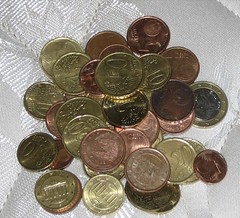Coin Collecting versus Coin Accumulating

Coin Collecting versus Coin Accumulating
The collecting instinct is a common trait among people; it shows up in many ways. You’ll discover that many of your friends are collectors of something. Who do you know who collects baseball cards, Hummel figurines, beer cans, Coca-Cola memorabilia, books, or dolls? Even people who claim to collect nothing probably have accumulations of some thing they haven’t even realized they’re accumulating — tools, newspapers, shoes, you name it. There’s a special comfort in collecting, in surrounding yourself with familiar objects and building a store of assets — perhaps in response to some primeval instinct that prepares you for a rainy day.
The allure of money is especially strong. Coins represent real value. Coins can be exchanged for other objects we desire. Coins travel throughout the world and through time itself, representing and absorbing history as they pass from one person to the next.
Oh, the stories coins could tell if they only had voices! And they’re everywhere, because no one anywhere ever throws away old money.
Pull a dime out of your pocket and what do you see? If all you see is 10¢ to spend, we’ve got a lot of work to do. But if you look at your dime and wonder at the artistic work of the engraver and the meaning of the symbols and the words, or if you see Franklin Roosevelt, the Great Depression, and the New Deal, man, you’re hooked. You’re going to make a great coin collector and, perhaps, one day, a numismatist!
We make the distinction in this book between numismatists (those who study coins) and coin collectors (those who collect coins). You can be a numismatist without being a coin collector, you can be a coin collector without being a numismatist, or you can be both.
Not sure whether you have that collecting instinct? Here’s a great way to find out whether you’re an accumulator or whether you have the potential to become a coin collector:
Visit your local coin store and purchase a folder made for the pennies from the ’70s, ’80s, and ’90s. A folder is a cardboard holder with holes for every different date.
Raid your change jar or go to the bank and buy $ 20 worth of pennies.
Sort out the coins and fill as many different holes as you can. If possible, find the best-looking coin to place in the folder.
After you’ve gone through all the coins, sit back and take a look at your work.
Do you wonder why some coins were harder to find than others? Do you wonder why you couldn’t find even a single example of some coins? Are you interested in completing the set? Did you have fun searching through the coins?
If you answered yes to any of these questions, you’ve discovered the difference between being a collector and an accumulator — and in case you’re wondering, you’re a collector.
Recommended Reading
- Canadian Coins
- How to Start Collecting Coins
- MLM - It’s NOT About You
- How to Buy Gold Bullion Coins
- Whistler’s Crankworx: World’s Greatest Freeride Festival Held July 15-24, 2011
Related posts:
- Canadian Coin Collecting: Pleasures versus. Treasures Canadian Coin Collecting: Pleasures versus. Treasures Article by lazaro 001 In North america in which cash the recognition of money indicates considerable enhance because the valuation on the “paper...

I’ve just started Coin Collecting and would like to buy from a place that won’t sell me junk!
I’ve just started Coin Collecting and would like to buy from a place that won’t sell me junk!
Does anyone know of movies that have something about coin collecting in them? Just curious.
Thank you!
I decided to collect 2007 coins because that was the year my role model came into my life. And I only have 1 dime with a 2007 on it. but I can work my way up. I get change all the time. But i didn’t even
think of going through the change to find a 2007 coin.
Several years ago my uncle died. He left quite a coin collection-not in any order-just gobs of coins. My aunt knows nothing about coin collecting or what to do with the coins-and neither do I. Does anyone know who she could contact (trustworthy and honest) to see about the coins or what her first step might be in organizing them and then selling them off?
I was looking at coin values and i noticed that depending on the coin its usually worth more if its made in San Fransico.Does anyone know why this is?
I am looking for some free coin collecting supplies like cases and gloves or magnifiers and whatnot. Anyone know where i can find some?? Thanks!!!